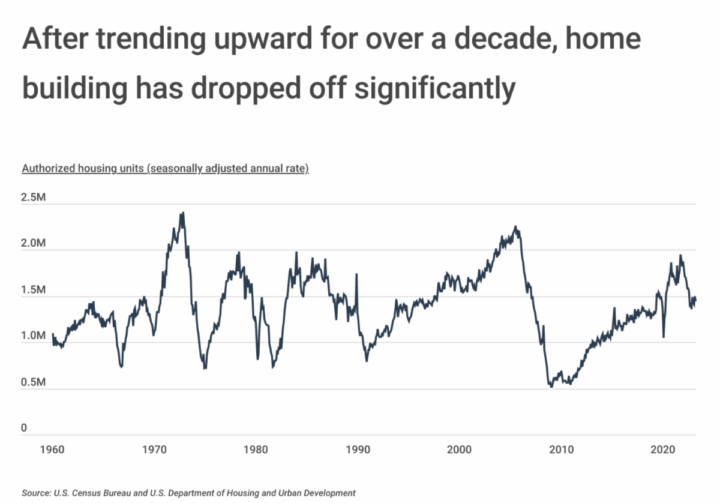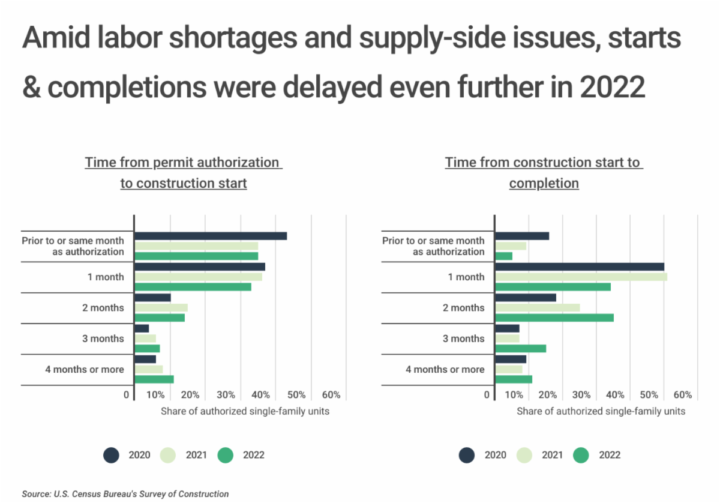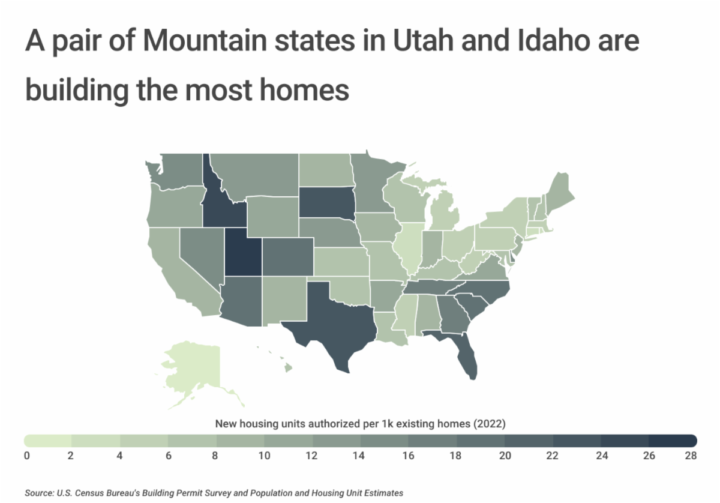Press release from Lattice Publishing:
Rising real estate values and increasing rents have stretched budgets for homebuyers and renters since the onset of the COVID-19 pandemic. The median home sales price in the U.S. jumped by over $150,000 from the first quarter of 2020 to the fourth quarter of 2022 amid low interest rates and a stronger-than-expected pandemic economy. Rent prices, on the other hand, remained suppressed for much of 2020 with COVID-related renter protections and rental assistance programs in place, but accelerated in 2021 and into 2022.
Since the beginning of 2022, the U.S. Federal Reserve has raised interest rates in an effort to combat inflation throughout the economy. Between rising mortgage rates and the rapid run-up in home values, the residential real estate market has cooled down. As of Q2 2023, the median home sale price declined 13.2%—down from just over $479,000 in Q4 2022. But while a leveling-out in demand may have helped to slow down price growth, these measures cannot solve another fundamental challenge in the U.S. housing market: a major shortage of housing supply.
Available single-family homes for sale sit at 1.3 million units, a mere 8.1% above the all-time low in February 2022. And with millennials now comprising the largest generational segment of the homebuying market, a lack of affordable entry-level homes has driven competition for housing and kept larger numbers of young adults renting, contributing to the elevated home and rent prices alike.
The lack of housing supply has been exacerbated by significant underinvestment in new housing since the Great Recession. New housing authorizations tend to fall temporarily during economic downturns, but the collapse of the housing market in the mid-2000s and ensuing recession sent authorizations to historic lows. The number of new residential units authorized has recovered slowly over the last decade, but as of June 2023, new authorizations declined 26% after peaking in December 2021. According to the National Association of Home Builders, persistently high inflation pushing up construction costs combined with elevated mortgage interest rates produced 12 straight monthly declines in builder confidence during 2022.
Despite a clear need for new housing supply, the construction industry struggled to keep up during the pandemic. COVID-related disruptions produced worker shortages and hindered supply chains, making it harder and more expensive to obtain building materials. As a result, more single-family units saw monthslong delays in the time it takes to start and complete construction when compared to years past.
The effects of these disruptions continue to linger in the residential housing industry. The share of authorized single-family units that took two months or longer to start construction after initial authorization increased from 29% in 2021 to 32% in 2022. These delays were even more prevalent when considering the time from construction start to completion, where 61% of authorizations took over two months to complete this phase compared to only 40% in 2021.
Although supply is a challenge across the U.S., some locations are moving faster than others in authorizing new construction. Fast-growing states in the Mountain West, like Utah, Idaho, and Colorado, along with Sun Belt destinations like Texas and Florida, lead the U.S. in the rate of new housing development. At the local level, major metros in these fast-growing states are also among those leading in new home construction.
To determine the metros building the most homes, researchers at Construction Coverage, a website that provides construction software and insurance reviews, analyzed the latest data from the U.S. Census Bureau and Zillow. The researchers ranked metro areas according to the number of new housing units authorized per 1,000 existing homes in 2022. In the event of a tie, the metro with higher total new housing units authorized in 2022 was ranked higher.
The analysis found that there were 15.0 new housing units authorized per 1,000 existing homes in the Asheville metro area in 2022—a total of 3,531 new units. Here is a summary of the data for the Asheville, NC metro area:
- New housing units authorized per 1k existing homes (2022): 15.0
- New housing units authorized per 1k existing homes (2020): 14.7
- Total new housing units authorized (2022): 3,531
- Total new housing units authorized (2020): 3,432
- Percentage change in housing units authorized (2020–2022): +2.9%
- Median home price: $416,320
For reference, here are the statistics for the entire United States:
- New housing units authorized per 1k existing homes (2022): 11.7
- New housing units authorized per 1k existing homes (2020): 10.5
- Total new housing units authorized (2022): 1,665,088
- Total new housing units authorized (2020): 1,471,141
- Percentage change in housing units authorized (2020–2022): +13.2%
- Median home price: $348,853
For more information, a detailed methodology, and complete results, see U.S. Cities Building the Most Homes on Construction Coverage.






Before you comment
The comments section is here to provide a platform for civil dialogue on the issues we face together as a local community. Xpress is committed to offering this platform for all voices, but when the tone of the discussion gets nasty or strays off topic, we believe many people choose not to participate. Xpress editors are determined to moderate comments to ensure a constructive interchange is maintained. All comments judged not to be in keeping with the spirit of civil discourse will be removed and repeat violators will be banned. See here for our terms of service. Thank you for being part of this effort to promote respectful discussion.